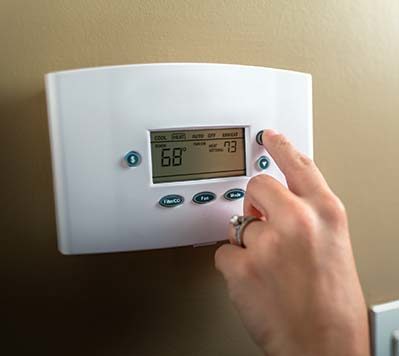Propane Furnaces vs. Electric Heat | Which is Better and Why
As Missouri heads towards the colder months, a common question among home buyers, builders and owners is: “What is the best way to heat my home?” For homeowners who want high performance, increased efficiency, dependability and environmental friendliness in their furnace, they don’t have to look any further than propane. Propane heat offers several advantages over electric, even those that use heat pumps. Plus, propane furnaces are easily paired with other propane appliances to maximize the efficiency and comfort level of a home. Read on to see why propane is the best choice to heat your home this winter, and for winters to come.
Propane vs. Electric Performance
Not all heating systems deliver air at the same temperature, and experiencing Midwest winters, propane’s performance makes it an obvious choice for a Missouri homeowner. Electric heat pumps deliver heat at or below your normal body temperature of 98.6 degrees Fahrenheit and when the temperature drops below 25 or 30 degrees Fahrenheit, they become inefficient. Propane furnaces deliver a warmer, more comfortable heat, up to 140 degrees Fahrenheit, regardless of the outdoor temperature. This means warmer air is circulated throughout the entire home. In addition, many high-efficiency propane furnaces are two-stage or variable speed units, so they heat homes steadily and comfortably.
Propane vs. Electric Efficiency
High-efficiency propane furnaces qualify for Energy Star’s Most Efficient label of 95 AFUE or higher. AFUE, or Annual Fuel Utilization Efficiency, is a measurement of a gas furnace’s efficiency in converting fuel to energy. A rating of 95 AFUE means a propane furnace can turn 95% of the energy it consumes into heat. In comparison, the minimum standard rating is 78%, and an average furnace usually operates between 80 and 85% efficiency. Electric furnaces are rated through different methods, so they do not have a comparable AFUE rating, but they are less efficient because of the way they operate. Electric furnaces must draw heat inside either from the outside air or ground, so they have to work harder to heat a home. Even then, when the outside temperature drops below about 25 degrees Fahrenheit, an electric furnace will need backup power to be able to produce more heat.
Propane vs. Electric Dependability
Beyond the advantages of warmer heat and greater efficiency, propane also provides the added benefit of being more dependable than electricity. Propane can be safely and securely stored in a tank on your property, while electricity can be subject to power outages. A propane tank can even be buried on a property to avoid having it in sight in your yard.
The average lifespan of a propane furnace is about 20 years, while electric heat pumps last about 14 years. On top of that, propane furnaces retain their efficiency better than electric ones, so they consistently save homeowners money and energy over time. The older an electric heat pump is, the more electricity it will require to do its job. Heat pumps can also have problems with low airflow, leaky ducts, and incorrect refrigerant charge. They are also estimated to lose about one percent of efficiency each year of operation, contributing to their shorter operating life.
For greater dependability and added security, the addition of a propane backup generator ensures that propane furnaces will continue to run, even when the power goes out.
Propane vs. Electric Clean Energy
Propane scores higher than electricity in terms of environmental friendliness, due to the fact it burns cleanly and produces significantly fewer greenhouse gas emissions than most other energy sources. In addition, propane is a non-poisonous, non-toxic fuel that won’t contaminate soil or groundwater, making it safe to use anywhere. More information can be found on the Environmental Benefits page.
When it comes down to choosing your heat source, propane is the best option to heat Missouri homes based on performance, efficiency, and dependability.
If you’re thinking about building a new home or replacing the current heating system in an existing home, talk with your local professional propane dealer. They can help you determine how propane can be a cost-effective solution to heat your home based on your situation and needs. There may be home builder incentives offered by appliance manufacturers or the national Propane Education & Research Council (PERC).
Be sure to ask about available rebates through the Missouri Propane Education & Research Council (MOPERC). *Previously displayed prior to PERC info in the previous paragraph.
